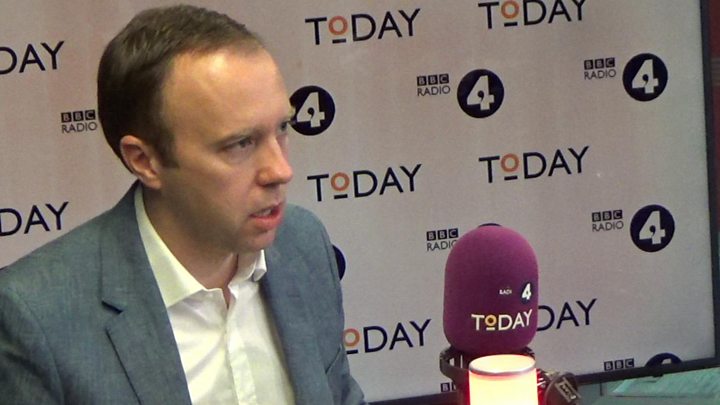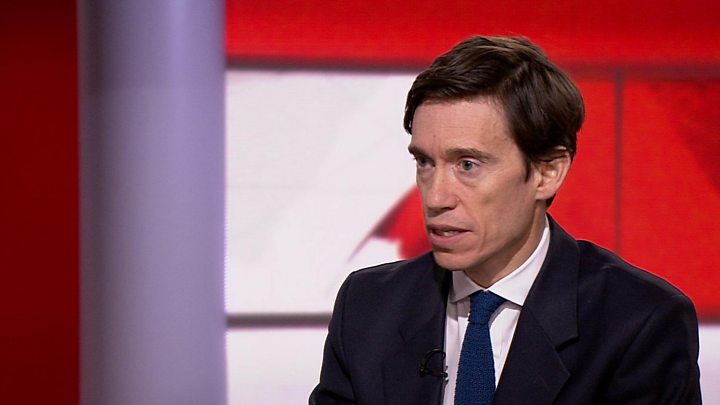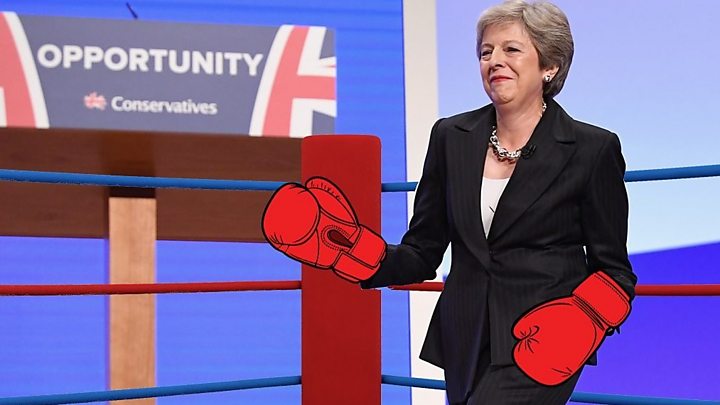
Media playback is unsupported on your device
Conservative leadership contenders have clashed over Brexit as the race to succeed Theresa May in No 10 begins.
Rory Stewart said he would not serve under rival Boris Johnson because of his backing for a no-deal exit.
Health Secretary Matt Hancock, the fifth Tory to enter the race, said Mrs May's successor must be more "brutally honest" about the "trade-offs" required to get a deal through Parliament.
The leadership contest will determine who is the UK's next prime minister.
Party bosses expect a new leader to be chosen by the end of July.
Mrs May confirmed on Friday that she will resign as party leader on 7 June, but will continue as PM while the leadership contest takes place.
She agreed with chairman of the Tory backbench 1922 Committee, Sir Graham Brady, that the process to choose a new leader should begin the week after she stands down.
Five candidates have, so far, confirmed their intention to stand:
- Foreign Secretary Jeremy Hunt
- International Development Secretary Rory Stewart
- Health Secretary Matt Hancock
- Former Foreign Secretary Boris Johnson
- Former Work and Pensions Secretary Esther McVey
'Fresh face' needed
Announcing his candidacy, Mr Hancock ruled out a snap general election in order to resolve the Brexit stalemate, saying this would be "disastrous for the country" and would risk seeing the Labour leader Jeremy Corbyn in power "by Christmas".
Instead, he said his focus would be on getting a Brexit deal through the current Parliament and "levelling" with MPs about what this would mean for the UK.
Mr Hancock told Radio 4's Today there was no point in becoming prime minister unless he was straightforward about the trade offs - "between sovereignty and market access and the trade-offs to get a deal through this Parliament".
He also said the party needed a "leader for the future not just for now", capable of appealing to younger voters.
"We need to move on from the horrible politics of the last three years," he said.
"We need a fresh start and a fresh face to ensure this country wins the battles of the 2020s and remains prosperous for many years to come."
'Huge tensions'

Media playback is unsupported on your device
Mr Stewart called for politicians to tell the truth about where they stood on Brexit and suggested, for that reason, he could not serve in a cabinet under Boris Johnson.
"It pains me to say it," he told BBC News.
"Boris has many, many qualities but I talked to him a few days ago and I thought he had said to me that he was not going for a no-deal exit.
"He has now come out and said yesterday that he is going for something which I believe is undeliverable, unnecessary and is going to damage our country and economy."
Mr Johnson told an economic conference in Switzerland on Friday that a new leader would have "the opportunity to do things differently".
"We will leave the EU on 31 October, deal or no deal. The way to get a good deal is to prepare for a no deal."
Most bookmakers have Mr Johnson as favourite, in front of former Brexit Secretary Dominic Raab and Environment Secretary Michael Gove, who has yet to declare his hand.
More than a dozen more senior Conservatives are believed to be seriously considering running - including Sir Graham, who has resigned as chair of the 1922 Committee.

Media playback is unsupported on your device
Work and Pensions Secretary Amber Rudd has ruled herself out, telling the BBC the party and the country wants "someone who is more enthusiastic about Brexit than I am".
Asked who she would support, she told Radio 4's Today she would "not malign" any of the candidates but would prefer someone who "wants to find a compromise" on Brexit and be realistic about what can be achieved".
Meanwhile, Conservative MP Steve Double criticised those who were not willing to countenance a no-deal Brexit under a new leader.
'Do things differently'
Tory MPs have until the week commencing 10 June to put their name forward, and any of them can stand - as long as they have the backing of two parliamentary colleagues.
The candidates will be whittled down until two remain, and in July all party members will vote to decide on the winner.
The Conservative Party had 124,000 members, as of March last year. The last leader elected by the membership was David Cameron in 2005, as Theresa May was unopposed in 2016.
It will be the first time Conservative members have directly elected a prime minister, as opposed to a leader of the opposition.
Announcing her departure in Downing Street on Friday, Mrs May urged her successor to "seek a way forward that honours the result of the referendum" and seeks "consensus" in Parliament.
Meanwhile, shadow chancellor John McDonnell suggested Labour might need to harden its position on another Brexit referendum if the Tories elected someone willing to pursue a no-deal exit.
Mr McDonnell told Today that "some form of public vote" would definitely be needed in that situation and he would seek to talk to MPs from all parties to potentially try and bring down a government that tried to take the UK out without a deal.
Who are the Conservative members?
Most members of most parties in the UK are pretty middle-class. But Conservative Party members are the most middle-class of all: 86% fall into the ABC1 category.
Around a quarter of them are, or were, self-employed and nearly half of them work, or used to, in the private sector.
Nearly four out of 10 put their annual income at over £30,000, and one in 20 put it at over £100,000. As such, Tory members are considerably better-off than most voters.
Read more from Prof Tim Bale here
https://www.bbc.com/news/uk-politics-48403705
2019-05-25 10:09:14Z
CBMiLWh0dHBzOi8vd3d3LmJiYy5jb20vbmV3cy91ay1wb2xpdGljcy00ODQwMzcwNdIBMWh0dHBzOi8vd3d3LmJiYy5jb20vbmV3cy9hbXAvdWstcG9saXRpY3MtNDg0MDM3MDU
Tidak ada komentar:
Posting Komentar